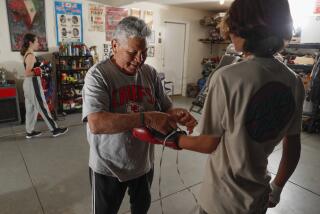ANALYSIS : Legacy of Gathers Sidelines a Boxer
- Share via
LAS VEGAS — The cloud that the death of Hank Gathers cast over the world of sports two years ago drifted into the boxing arena here Saturday night and greatly influenced the cancellation of the Terry Norris-Simon Brown fight.
Just hours before he was to box for the junior-middleweight title, Brown felt dizzy and called his agent/adviser James Cooks. Cooks did what everyone in sports in a decision-making position must do in the wake of the death of Loyola Marymount’s basketball star on March 4, 1990, especially when there is even the hint of heart irregularity. He called in the doctors and immediately became ultra-conservative.
So when the subject of Gathers was broached to Cooks at Valley Hospital Medical Center, where Brown was taken and from where the decision was made to cancel the fight, he was eager to grab the opening.
“Hank Gathers is exactly it,” he said. “I want you to write my name down right now, and write that that’s what this is all about. Hank Gathers. That’s what was on my mind, and that is what’s on a lot of people’s minds in my position these days. I just can’t let my boxer take that kind of chance, not after the way the Gathers thing came down.”
The scene at the hospital was relatively subdued when Brown emerged at 5:45 p.m., an hour and half before the fight was scheduled, to meet a small gathering of TV cameras, a newspaper reporter and HBO’s Larry Merchant.
Brown, looking like anything but a hospital patient with his black leather cap in place and a gold cross hanging from his neck, was a dazed young man. Clearly, it was just starting to dawn on him what had happened, that his shot at Norris and the title was postponed at least for months and probably years--or forever--and that a $180,000 payday had disappeared.
The first thing he expressed was anger, tempered with a degree of sadness and amazement that his big day had turned into his worst day.
“If I had the slightest idea they were going to hold me here, that it was gonna get called off, I wouldn’t be here right now,” he said. “I’d be back there, in the ring, fighting. I had my bag packed, my shoes, my cup, everything ready.”
Cooks said that there had been an angry confrontation in the emergency room of the hospital, once Brown realized that he would not be allowed to fight. The confrontation was between Brown and his advisers, and that included Brown’s promoter, Don King, to whom Cooks gave much credit for making it clear to Brown that his health, not the money, was the top consideration.
Nevertheless, the entire situation left Brown dazed.
“I thought I’d just come here, they’d give me a pill to take care of everything and they’d send me back to fight,” he said, looking at the bandage on his arm that covered the spot where blood had been drawn and shaking his head.
The irony of all this is that, this time all the Gathers-related precautions might have been overkill. According to Tony Fredrick, the emergency room physician at Valley Medical Center, the only clear diagnosis he could make was that Brown had an inner-ear infection. That’s what made him dizzy, and that’s what Fredrick was treating with a drug called antivert. Basically, Brown suffered from vertigo.
“He was just feeling like he would fall over,” said Fredrick, not entirely missing the humor of that sort of condition for a boxer.
But even if it was simply an ear infection this time, the Gathers-inspired caution was well-based.
Brown’s wife, Lisa, sitting in the waiting room with his sister, Nadine, pointed to at least four times since Brown lost to Buddy McGirt in Las Vegas last November that her husband has been tested for possible heart-related problems.
“After McGirt, he was in this very hospital for three or four days and had all sorts of tests,” Lisa Brown said. “He checked himself out of here. They wanted him to stay longer, but he checked himself out. He had heart problems then, but he didn’t let that be known. You know how boxers are.”
She said that the problems cropped up again in February, and Brown, who lives in suburban Washington, checked himself into Georgetown University Hospital and, under the care of Dr. James Koon, had an EKG and stayed overnight.
Then, earlier this week--and reportedly unbeknown to fight officials and organizers here--Brown had chest pains and went to a hospital here to be checked out once again.
So, clearly, the decision by Cooks, King and Brown’s family to err on the side of caution was highly justifiable, even if it left Brown dazed and confused and not quite able to grasp the reality of what had happened, and was happening, to him.
“Now that this is all checked out, I’m ready to fight Terry Norris,” he said. “I’m not concerned about this. I just love boxing. It’s what I do best. These chest pains in my chest, that’s part of boxing. Boxing is pain. You do roadwork. You get hit a lot in the chest.
“I just hope they can hold this fight in three or four days, or maybe next week.”
Sadly for Brown, that was wishful thinking.
After all the cameras and notepads left Valley Medical Center, he went back into the emergency room, where more tests were scheduled, including an MRI. Before he leaves Las Vegas, he probably will undergo every test imaginable to make sure his heart works like an athlete’s must.
Whether Simon Brown knows it or not, that is a legacy left to him by a basketball player named Hank Gathers.











